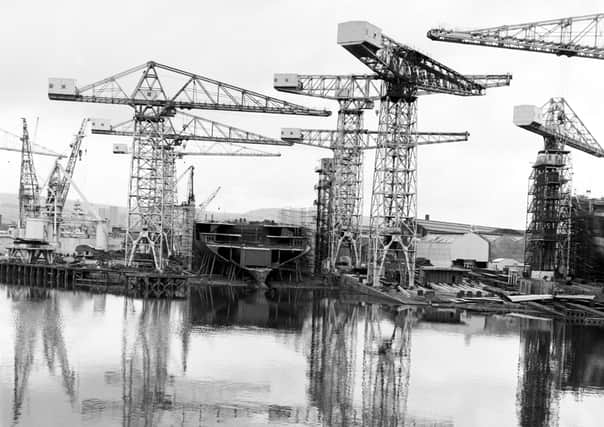Ben Lowry: Like Scotland, Northern Ireland is becoming a place apart that is addicted to UK cash


Mr Neil, a newspaper editor turned feared TV political interviewer, criticised Boris Johnson for bluntly describing the Scottish assembly as “a disaster” for the Union.
But Mr Neil also said that the prime minister had a point, and he accused the ruling Scottish National Party of serious failures.
Advertisement
Hide AdAdvertisement
Hide AdMale life expectancy in east Glasgow is lower than Djibouti, Africa and fewer poor Scottish children go to university than English children do.
After “remorseless expansion by the state, Scotland is now one of the most over-governed, bureaucratised countries” in the West, Mr Neil wrote. “The Scots once built the British Empire. Now they build bureaucratic empires.”
There is, he added, no “dynamic new commercial sector, as exists in London or Manchester”.
Mr Neil, who rose from a council house in Paisley to the top of media through talent and slog, has impeccable credentials to write such a critique.
Advertisement
Hide AdAdvertisement
Hide AdHe attended a “grammar school which would have matched any private [school in England and] won a place at Glasgow university, one of the oldest universities in the world, where there were plenty of other working-class students”.
It is a familiar story in Northern Ireland: massive expansion of the state, with little sign of a dynamic private sector.
The Scots have left a deep imprint in Ulster, where we have mirrored their rise and fall.
Belfast News Letters of the 1730s report on the bustling civilisation they had built here, a century after the plantation.
Advertisement
Hide AdAdvertisement
Hide AdThere are adverts for early boats to America, where such Ulster folk became influential among the pioneers. More than a dozen of the (soon to be) 46 US presidents have clear Scots Irish ancestry.
The decline in Scotland which Mr Neil cites is also a wider Anglo Saxon one, and is apparent in working class English estates (social problems that are less common in places with linked histories to Britain, such as Scandinavia).
The challenges are particularly evident in Scotland, in Protestant working class estates in Northern Ireland, and in the Scots Irish in the US.
In his best selling book Hillbilly Elegy, JD Vance, from Kentucky, documents his community’s struggle with joblessness and drugs.
Advertisement
Hide AdAdvertisement
Hide AdVance writes: “... I do not identify with the WASPS (White Anglo Saxon Protestants) of the Northeast. I identify with the millions of working-class white Americans of Scots-Irish descent who have no college degree.”
The reasons for the decline are complex and I think linked to a drawbridge mentality (God helps those who help themselves) that was key to the success of Scotland-Ulster-US, but which always left some people behind.
Such a society is in trouble when industry wanes.
The shared past glory is not in doubt, both among those who went to the new world and those who stayed behind. Northern Ireland, like Scotland, was an industrial powerhouse a century ago. Belfast was Ireland’s centre of science.
Now, like Scotland, we are addicted to Treasury handouts in ways that damage the Union. Our strategy is to demand yet more (ungratefully).
Advertisement
Hide AdAdvertisement
Hide AdAs with the Scots, we are becoming a place apart from England, and Stormont can exacerbate that. Robert McCartney QC’s warnings about devolution, and his 1980s campaign for ‘real unionism,’ to integrate with Great Britain, have in many respects aged well.
Back and forth links to Scotland long predate the plantation, but in recent centuries became of huge cultural and economic value.
Soon this newspaper will run essays defending Northern Ireland’s (unfairly maligned) history, as its centenary gets close, by the Francis Hutcheson Institute, named after the philosopher born in Co Down in 1694. The ‘Father of the Scottish Enlightenment’, he taught in Glasgow and influenced the brilliant thinkers Adam Smith and David Hume.
Maybe Northern Ireland will witness a Scots Irish renaissance in some sphere of industry such as cyber technology. But it is hard to see it happen when NI is mired in the politics of dependency.
Advertisement
Hide AdAdvertisement
Hide AdI fear that Covid will be used to scrap exams again, then to undermine grammar schools. The social mobility of schools such as Grosvenor and St Mary’s, once near each other in west Belfast, is at long term risk.
English apathy has played a role in the malaise. A succession of uninformed secretaries of state, beholden to the Northern Ireland Office, have not helped the Union.
But London has begun to signal that it will not bail out Northern Ireland indefinitely with blank cheques.
That might yet spur us on to better things.
• Ben Lowry (@benlowry2) is News Letter deputy editor
• Ben Lowry: Just imagine if the Holylands was 94% Protestant
• Ben Lowry: Pain must be shared if we have long lockdowns
——— ———
A message from the Editor:
Advertisement
Hide AdAdvertisement
Hide AdThank you for reading this story on our website. While I have your attention, I also have an important request to make of you.
With the coronavirus lockdown having a major impact on many of our advertisers — and consequently the revenue we receive — we are more reliant than ever on you taking out a digital subscription.
Subscribe to newsletter.co.uk and enjoy unlimited access to the best Northern Ireland and UK news and information online and on our app. With a digital subscription, you can read more than 5 articles, see fewer ads, enjoy faster load times, and get access to exclusive newsletters and content. Visit https://www.newsletter.co.uk/subscriptions now to sign up.
Our journalism costs money and we rely on advertising, print and digital revenues to help to support them. By supporting us, we are able to support you in providing trusted, fact-checked content for this website.
Alistair Bushe
Editor